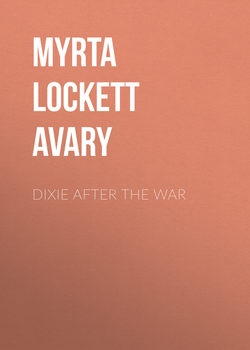Читать книгу Dixie After the War - Myrta Lockett Avary - Страница 11
CHAPTER X
Our Friends, the Enemy
ОглавлениеThere was small interchange of civilities between Northern and Southern ladies. The new-comers were in much evidence; Southerners saw them riding and driving in rich attire and handsome equipages, and at the theatre in all the glory of fine toilettes.
There was not so much trouble opening theatres as churches. A good many stage celebrities came to the Richmond Theatre, which was well patronised. Decorated with United States flags, it was opened during the first week of the occupation with “Don Cæsar de Bazan.” The “Whig” reported a brilliant audience. Mrs. Lincoln and Mrs. Grant, who had been driving over the city, were formally invited by General Weitzel to attend the play, but did not appear.
The band played every evening in the Square, and our people, ladies especially, were invited to come out. The Square and the Capitol were at one time overrun with negroes. This was stopped. Still, our ladies did not go. Federal officers and their ladies had their music to themselves. “There was no intentional slight or rudeness on our part. We did not draw back our skirts in passing Federal soldiers, as was charged in Northern papers; if a few thoughtless girls or women did this, they were not representative. We tried not to give offense; we were heart-broken; we stayed to ourselves; and we were not hypocrites; that was all.” So our women aver. In most Southern cities efforts were made to induce the ladies to come out and hear the band play.
The day Governor Pierpont arrived, windows of the Spotswood and Monumental were crowded with Northern ladies waving handkerchiefs. “I only knew from the papers,” Matoaca tells, “that the Mansion was decorated with flowers for his reception. Our own windows, which had been as windows of a house of mourning, did not change their aspect for his coming. Our rightful governor was a fugitive; Governor Pierpont was an alien. We were submissive, but we could not rejoice.” This was the feminine and social side. On the political and masculine side, he was welcomed. Delegations of prominent Virginians from all counties brought him assurances of coöperation. The new Governor tried to give a clean, patriotic administration.
Northerners held socials in each others’ houses and in halls; there were receptions, unattended by Southerners, at the Governor’s Mansion and Military Headquarters. It might have been more politic had we gone out of our way to be socially agreeable, but it would not have been sincere. Federal officers and their wives attended our churches. A Northern Methodist Society was formed with a group of adherents, Governor and Mrs. Pierpont, and, later, General and Mrs. Canby among them. “We of the Northern colony were very dependent upon ourselves for social pleasures,” an ex-member who now considers herself a Southerner said to me recently. “There were some inter-marriages. I remember an elopement; a Petersburg girl ran away with a Federal officer, and the pair sought asylum at my father’s, in Richmond’s Northern colony. Miss Van Lew entertained us liberally. She gave a notable reception to Chief Justice Salmon P. Chase and his beautiful daughter, Kate.” Miss Van Lew, a resident, was suspected of being a spy during the war.
